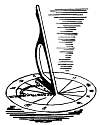|
A Radio Talk by Charles F. Kettering For centuries men believed the earth to be the center of the universe - and that the sun, moon and stars all revolved around it.  Calculating the time of the year, assumptions were very difficult. All
this was changed by Copernicus
about the time Columbus discovered America.
Calculating the time of the year, assumptions were very difficult. All
this was changed by Copernicus
about the time Columbus discovered America.But long before the telescope and other astronomical instruments were invented, this Polish scientist and astronomer proved by simple observation and calculation that the sun is the center of our universe - and that the day is the result of the earth's rotation about its axis, and the year of its journey around the sun in its orbit. This new idea explained the changes in the length of night and day and winter and summer, but left the need for a method of measuring hours - minutes - and seconds unfilled. Devices of many kinds were constructed and I know of nothing that has tested man's inventive ability more than time-keeping. |








